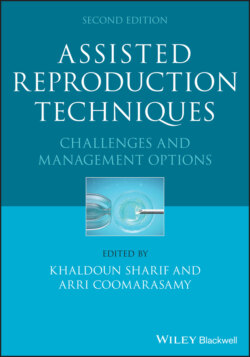Читать книгу Assisted Reproduction Techniques - Группа авторов - Страница 121
Hypothyroidism
ОглавлениеIn iodine replete countries, the incidence of hypothyroidism diagnosed before pregnancy is about 1%, the commonest cause being primary thyroidal failure due to autoimmune thyroiditis. In addition, approximately 2.5% of pregnant women have subclinical hypothyroidism, defined by an elevated serum TSH concentration but normal free T4 and free T3 concentrations [3]. This can be indicative of the early stages of thyroid insufficiency or inadequate thyroxine replacement in previously diagnosed overt hypothyroidism. Worldwide iodine deficiency remains the leading cause of hypothyroidism. In affected countries the WHO has recommended routine iodine supplementation to ensure a daily iodine intake of 250 μg during pregnancy and lactation [4].
The risks of untreated overt hypothyroidism in pregnancy are well documented (Table 13.1). Several studies have now also associated subclinical hypothyroidism during the first half of pregnancy with an increased risk of miscarriage [5], preterm delivery [5,6], and neuropsychological deficiencies in the offspring [7]. Maternal thyroid hormones are believed to be crucial for the normal development of the placenta and the fetus, particularly the central nervous system, especially in the first trimester of pregnancy prior to the onset of fetal thyroid hormone production in mid‐trimester [8]. There is good evidence that adequate treatment of overt hypothyroidism and the rapid normalization of thyroid function during pregnancy is associated with good obstetric outcomes [3,5]. However, two large clinical trials that assessed if the screening for and treatment of subclinical hypothyroidism from the first and early second trimesters have shown no treatment benefit in relation to offspring neurodevelopmental outcomes [9,10]. The secondary outcomes of pregnancy complications also showed no significant differences between treatment arms. Some have argued that this is because treatment was commenced too late in pregnancy. The issue of whether to treat subclinical hypothyroidism, if found preconception, remains controversial. In cases of ART, a meta‐analysis of studies suggested that levothyroxine treatment to achieve a TSH less than 2.5 mU/L prior to conception could improve live birth rates [11]. On the other hand, in cases of euthyroidism, simply having TPO antibodies does not warrant levothyroxine treatment preconception or during pregnancy as this does not change pregnancy outcome [12].
Table 13.1 Obstetric complications associated with untreated overt maternal hypothyroidism [21].
| Miscarriage (first and second trimesters) Pregnancy‐induced hypertension Preeclampsia Anemia Postpartum hemorrhage | Preterm birth Low birthweight Stillbirth Perinatal death |
